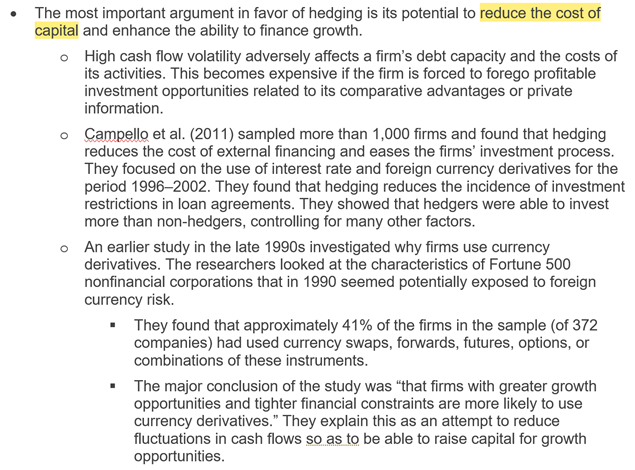You are using an out of date browser. It may not display this or other websites correctly.
You should upgrade or use an alternative browser.
You should upgrade or use an alternative browser.
Lowering Cost of Capital
- Thread starter umerkhan
- Start date
Hello @umerkhanOne of the advantages for a firm to hedge its risk exposures is 'the possibility of lowering its cost of capital (debt or equity), which could lead to increased economic growth.'
Q. How lowering its cost of capital may benefit a firm?
Thank you
Can you be more specific about which reading you are referring to in Topic 1? It is easier for me (and other members) to help with references if you are more specific.
Thank you,
Nicole
Hello @umerkhanThank you Nicole
Its 'Corporate Risk Management: A Primer'. Advantages (in practice) of hedging risk exposures
Thank you for providing the reading. I'm not sure if you've had the chance to look at the study notes yet, but on page 24 it lists the ways that lowering its cost of capital may benefit a firm. See below. I hope this helps!

Let us take a practical example. A US company exports goods to Europe. It generates revenue in Euro which will be converted to USD. So it is exposed to foreign exchange risk. If company does not hedge foreign exchange risk, it may have very fluctuating Profit & loss statement. High deviations in income statement means high risk. No lender wants to lend money to company whose income statements has high deviations. Due to high perceived risk in income statement, company is considered risky and lender will lend money at high rate of interest which increases the cost of capital and lowers the profitability. I hope i have answered your question.One of the advantages for a firm to hedge its risk exposures is 'the possibility of lowering its cost of capital (debt or equity), which could lead to increased economic growth.'
Q. How lowering its cost of capital may benefit a firm?
Thank you
Last edited:
saifullahfrm
New Member
niceLet us take a practical example. A US company exports goods to Europe. It generates revenue in Euro which will be converted to USD. So it is exposed to foreign exchange risk. If company does not hedge foreign exchange risk, it may have very fluctuating Profit & loss statement. High deviations in income statement means high risk. No lender wants to lend money to company whose income statements has high deviations. Due to high perceived risk in income statement, company is considered risky and lender will lend money at high rate of interest which increases the cost of capital and lowers the profitability. I hope i have answered your question.
gprisby
Active Member
Let us take a practical example. A US company exports goods to Europe. It generates revenue in Euro which will be converted to USD. So it is exposed to foreign exchange risk. If company does not hedge foreign exchange risk, it may have very fluctuating Profit & loss statement. High deviations in income statement means high risk. No lender wants to lend money to company whose income statements has high deviations. Due to high perceived risk in income statement, company is considered risky and lender will lend money at high rate of interest which increases the cost of capital and lowers the profitability. I hope i have answered your question.
Great explanation. This is what helped make this concept click for me. Less volatility in cash flows means less risk and subsequently cheaper financing costs.
Similar threads
- Replies
- 0
- Views
- 96
- Replies
- 0
- Views
- 108
- Replies
- 0
- Views
- 137
- Replies
- 0
- Views
- 121
